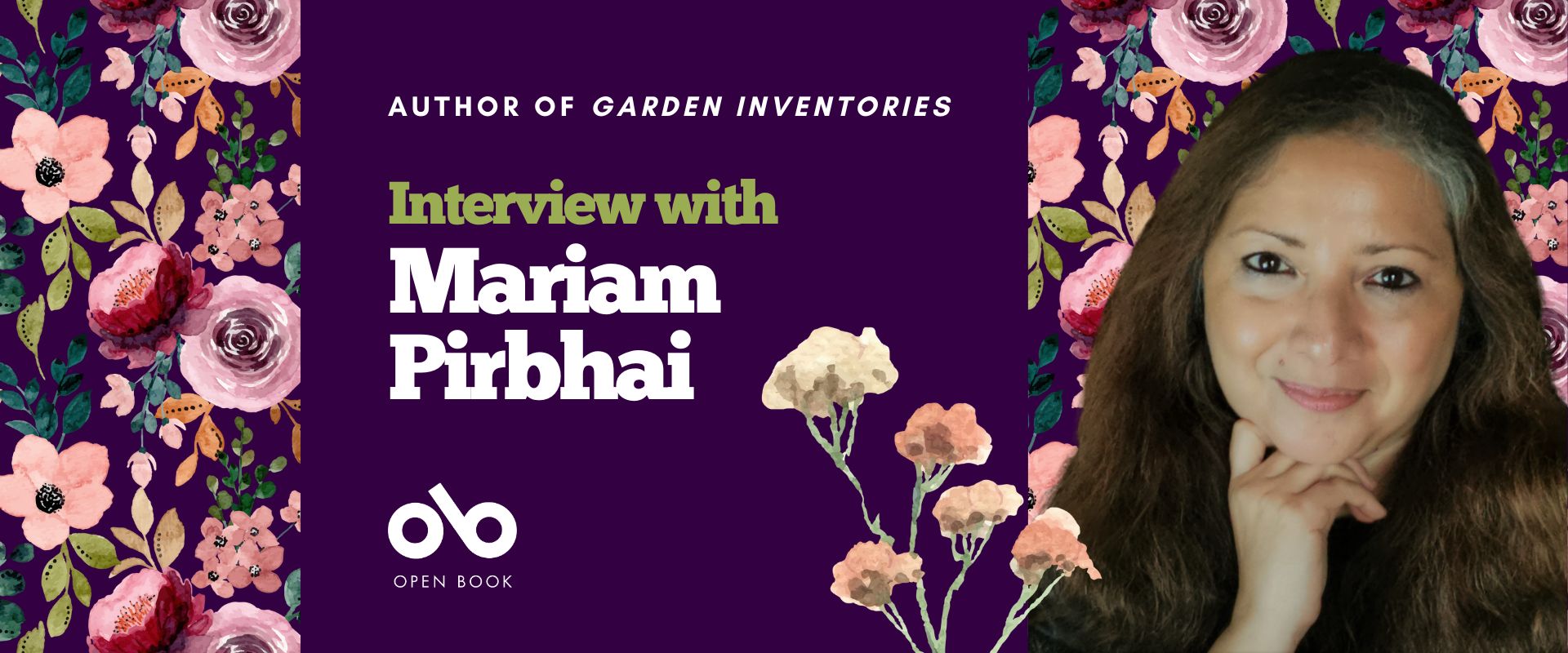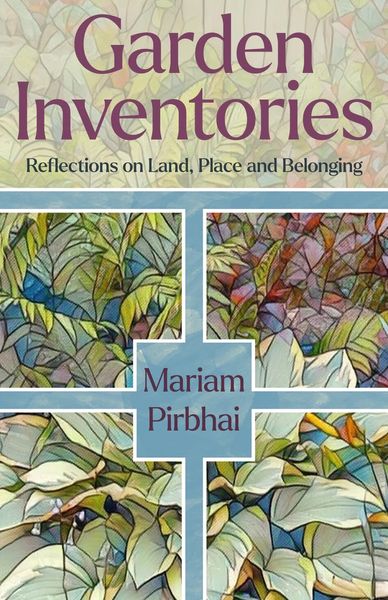Mariam Pirbhai Digs Deep to Find Profound Truths in Gardens, and Ourselves
We are surrounded by plantlife all the time, and yet, how often do we really think about the ways that we interact with even the most familiar vegetation? Perhaps it takes a person who has travelled far and wide, who has seen the far-flung places in the world and finally set roots, to really take a close look at the green spaces that we live with each and every day.
Already an established fiction writer and Professor of English at Wilfred Laurier University, Miriam Pirbhai explores her discoveries in gardening in the new nonfiction book, Garden Inventories: Reflections on Land, Place and Belonging (Wolsak & Wynn). She began gardening after years of travel led her to settle in Waterloo, Ontario, and quickly discovered that plants held many fascinating truths, and, in many ways, are not so different from people.
She builds on this inspiration to look at the local nurseries, neighbourhood gardens, and nature trails that abound in our communities, and explores the many ways that people interact with the land around us. Further yet, she reflects on the very meaning of nature in our cultural ideals, and our identities, and what the stories of plants can tell us about our understanding of land, place, and belonging. From backyard garden to great Canadian wilderness, Pirbhai illuminates these spaces and what they contain with poignancy and humour.
Today we're speaking with Miriam about Garden Inventories: Reflections on Land, Place and Belonging as part of our True Story nonfiction series, which focuses on memoir writing. She talks about her exploration of gardens, how her ideas germinated, and how she found herself writing this love letter to the place that she has called home and cultivated for nearly two decades.
Open Book:
Tell us about your new book and how it came to be. What made you passionate about the subject matter you're exploring?
Mariam Pirbhai:
Garden Inventories: Reflections on Land, Place and Belonging is a work of creative nonfiction through the lens of nature writing and memoir. It concerns the space of the garden, but also gardens as they are connected to our neighbourhoods, conservation areas, natural spaces, and urban landscapes--or, simply put, to the land in which we live.
I have lived in Waterloo, Ontario (aka: the Grand River region of southern Ontario) for just about eighteen years now. It is only in Waterloo that my husband and I have had time to create a garden. In many ways, this book is a love letter to this place—to this process of taking that first tentative step into a garden and, with it, into the land and landscape of southern Ontario. As people who have never lived in one home (both in and outside Canada) for more than a few years at a stretch, it was important for me to reflect on what it means to belong to a place, and what it means to cultivate a relationship not only to a culture or a community but also to a land.
I have always been passionate about the subject of migration, belonging, and identity, as an academic and as a creative writer. This book harnesses that same passion, but in a much more personal way.
OB:
Is there a question that is central to your book? And if so, is it the same question you were thinking about when you started writing or did it change during the writing process?
Your CanLit News
Subscribe to Open Book’s newsletter to get local book events, literary content, writing tips, and more in your inbox
MP:
Writing is always a process of discovery, so the questions we ask ourselves at the early stages of writing often shape-shift and deepen along that journey. The first question had to do with the act of gardening itself, or at least ideas about gardens and gardening. It occurred to me that when we buy a house or come to occupy a place, we also inherit ideas about that place. For instance, inside our homes we inherit someone else’s taste in things like wallpaper and paint colour choices. Outside, we inherit a garden or, if we don’t have a garden, a street, a park, etc. My central question concerned what kind of garden I have come to inherit here, not only in this suburban landscape but also as an extension of a land so drastically altered by colonization and the choices – botanical, horticultural, social, cultural and even ideological – made by other kinds of settlers who brought their own ideas of land and place (and gardens) with them.
And with this, another set of questions arose: what kind of garden do I want to create? And will that garden be created through a meaningful relationship with this land? Or will it be created through the filter of another’s, or even my own, inherited ideas about land and place?
OB:
What was your research process like for this book? Did you encounter anything unexpected while you were researching?
MP:
This book involved research into areas that were all new to me. From the history of this locality – my neighbourhood at the north-east end of Waterloo – to botanical histories and North American gardening habits. Everything required some level of research, from talking to neighbours to getting into city archives. I was trying to paint a picture of what this area might have looked like before it was turned into these residential allotments of quarter acre to one-acre plots.
Of course, there is a lot of research that doesn’t make it into a book, at least not directly. But there is always something to be gained from the process. For instance, I came across the little-known fact that a “green space” at the heart of our neighbourhood was once a small air strip and flying club established in the late 1920s. The air strip is now a parking lot and a baseball field—a kind of utilitarian use of public land quite typical for this area (itself an interesting insight into ideas about land and place). But now, every time I drive or walk by this “green space,” I see the ghost of some fighter aircraft or old Cessna taking flight above our houses and treetops. This little tidbit has grown wings in my imagination.
OB:
Do you remember the first moment you began to consider writing this book? Was there an inciting incident that kicked off the process for you?
MP:
Yes, I do! It was during the pandemic lockdown when we were all walking around our neighbourhoods because we had little else to do. Eventually, those walks extended into riverside trails, conservation areas and other natural spaces. It was then that I realized that my garden didn’t really reflect those natural spaces, in the sense that none of the shrubs or wildflowers or trees growing “out there,” in the wild, were typical of the kinds of things we grow in our gardens. So, I started snapping hundreds of photos and making plant lists in my writing journal.
The more I learned about the vegetation outside the space of our garden, the more I realized there was a troubling disconnect between what we plant (what our nurseries “sell us,” both in terms of plants and ideas about gardening) and the biodiversity of the land in which we live. As someone who was trying to understand her own place in this landscape (as an immigrant and as a novice gardener), this disconnect just didn’t sit well with me. I felt I was being hoodwinked about what a garden should or should not look like in this environment. This is how Garden Inventories took root.
OB:
What defines a great work of nonfiction, in your opinion? Tell us about one or two books you consider to be truly great books.
MP:
Alicia Elliott’s A Mind Spread Out on the Ground, Robin Wall Kimmerer’s Braiding Sweetgrass: Indigenous Wisdom, Scientific Knowledge, and the Teachings of Plants, and Madhur Anand’s This Red Line Goes Straight to Your Heart, are all brilliant examples of nonfiction, in my opinion. Elliott’s work blends the political and personal in such a powerful way. Kimmerer’s Braiding Sweetgrass is an exquisite treatise on how Indigenous and Western knowledge, can be allies rather than antagonists, though not without some effort, on our part, to do the work of decolonization. Anand’s experimental memoir puts science and art “back” into conversation—it is an experiment in every sense of the word, asking us to look at things from its slightly quirky and decentred angles.
And speaking of quirky, I also enjoyed stand-up comedian and actor Ali Hassan’s memoir, Is There Bacon in Heaven. Not only can I relate to it as a Pakistani-Canadian (like Hassan), but because it approaches subjects such as religion, race, migration and belonging with such a charming blend of humour and vulnerability. I like to think that Garden Inventories is also a funny book—after writing quite a few academic books and a few works of fiction, it’s been quite liberating to flex that funny bone!
Perhaps that’s an aspect of CNF I love the most: it’s a genre through which we can learn so much and have a good chuckle at the same time! It’s a genre that allows us the space to express ourselves, as ourselves. And it’s also okay if that version of ourselves changes or evolves, in the telling.
____________________________________________
Mariam Pirbhai is the author of a debut novel titled Isolated Incident (Mawenzi 2022) featured among CBC’s “65 Works of Fiction to Watch For in Fall 2022); and a short story collection titled Outside People and Other Stories (Inanna 2017), winner of the IPPY and American BookFest Awards. Pirbhai is Professor of English at Wilfrid Laurier University, where she teaches and specializes in postcolonial studies and creative writing. She is also the author or editor of several academic books on the global South Asian diaspora, including Mythologies of Migration, Vocabularies of Indenture: Novels of the South Asian Diaspora in Africa, the Caribbean, and Asia-Pacific (University of Toronto Press 2009), and Critical Perspectives on Indo-Caribbean Women’s Literature (Routledge 2013). Pirbhai has served as President of CAPS (Canadian Association of Postcolonial Studies, formerly CACLALS), Canada’s longest-running scholarly association devoted to postcolonial and global anglophone literatures. Pirbhai is the daughter of Pakistani immigrants whose arrival in Canada followed a circuitous route from England, the United Arab Emirates and the Philippines. She and her husband live in Waterloo, Ontario.




